UHC Forum 2017 was held at the Tokyo Prince Hotel on Dec. 13-14.
The Japan International Cooperation Agency (JICA) co-hosted the Forum with the World Bank; the World Health Organization (WHO); the United Nations Children's Fund (UNICEF); UHC2030*1; the Ministry of Finance, the Ministry of Foreign Affairs; and the Ministry of Health, Labour and Welfare of Japan. High-level government officials from various countries, representatives of international agencies and experts — including Japanese Prime Minister Shinzo Abe and United Nations Secretary General António Guterres — gathered in one place and adopted the Tokyo Declaration on Universal Health Coverage, a commitment to achieve universal health coverage (UHC) by 2030.
Universal health coverage (UHC) is the situation that all people can receive the quality and essential health services they need. This includes public health services designed to promote better health, prevent illness, and to provide treatment, rehabilitation and palliative care of sufficient quality, while at the same time it is ensured that the use of these services does not expose the user to financial hardship. According to "Tracking Universal Health Coverage: 2017 Global Monitoring Report," released on Dec. 13 by WHO and the World Bank, at least half of the world’s population (3.5 billion people) still does not have access to quality essential health services to protect and promote health, 800 million people are spending at least 10 percent of their household budget on out-of-pocket health care expenses, and nearly 100 million people are being pushed into extreme poverty each year because of health care costs. UHC is incorporated into one of the targets of the sustainable development goals (SDGs)*2, which the international community has agreed to achieve in 2015.
The Forum was held with the objective of discussing how to achieve UHC by 2030, the target year of the SDGs. As JICA's contribution, JICA President Shinichi Kitaoka and Vice President Takao Toda spoke at the main conference on Dec. 13-14, and JICA hosted or co-hosted several side events on Dec. 12 and 15.
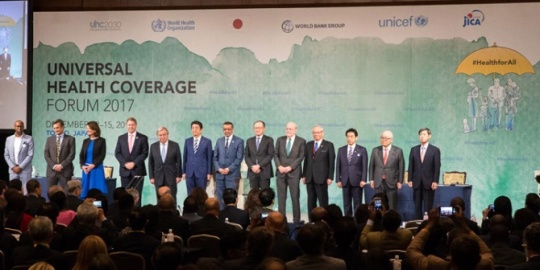
Speakers from co-host agencies with JICA President Shinichi Kitaoka (Left)
1. Main conference (Dec. 13-14)
At the opening session on Dec. 14, Mr. Abe gave the keynote address. Other speakers included Mr. Guterres; Senegalese President Macky Sall; Myanmar President Htin Kyaw; Bill Gates, co-chair of the Bill & Melinda Gates Foundation (in a video message); World Bank President Jim Yong Kim; WHO Director-General Tedros Adhanom; UNICEF Executive Director Anthony Lake; World Medical Association President Yoshitake Yokokura; and Mr. Kitaoka. Together with the leaders of the various countries and organizations, JICA strongly declared its commitment to promoting UHC.
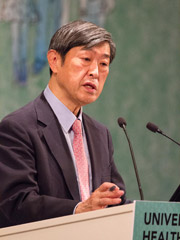
JICA President Shinichi Kitaoka gives a speech
Mr. Kitaoka said that health is the most fundamental right for every human being. He talked about Japan’s experience in achieving UHC in 1961, which played a role as the driving force of high speed economic growth of Japan after the World War II. It was emphasized that health promotes social stability and economic growth. Mr. Kitaoka also mentioned that health unites the world since it is necessary to come together despite differences in nationalities, ethnicities and religions to protect people’s well-being. UHC needs to be achieved through creating a health-promoting society, including ensuring safe water, appropriate sanitation, nutrition and education for the achievement of various SDGs. He committed to working continuously with over 140 countries in the areas of people's health.
At the closing session on the evening of Dec. 14, as an outcome of the Forum, the Tokyo Declaration on Universal Health Coverage was adopted. Pillars of the declaration as a commitment to achievement of UHC by 2030 include strengthening global momentum, accelerating country-led process and innovation. After Minister of Health, Labour and Welfare Katsunobu Kato gave an introduction to the declaration, Mr. Kitaoka emphasized that JICA values human security and human-centered development and that promotion of UHC embodies those two values. He promised that, in alignment with the pillars of declaration, JICA would 1. play a joint leadership role in strengthening the global momentum, 2. work with other development partners, civil society and the private sector, and 3. strengthen its partnership with research institutions and the private sector to promote innovation. Deputy Prime Minister and Minister of Finance Taro Aso gave the closing address. He emphasized that it is essential for the finance minister from each country to be involved to secure financial resources for achieving UHC, and that it is important to effectively utilize international funding, including innovative financing tools.
At the ministerial and technical discussions held on Dec. 13 in advance of the high-level forum, information was shared on how UHC and the response to public health emergencies have progressed globally and on how various global initiatives have addressed UHC. Themes discussed in breakout sessions included health systems, human resources for health, health financing, access to medicines and the aging society, all of which are important issues for UHC. Mr. Toda of JICA spoke at the opening session about reducing inequality and the need for a multi-sectoral approach. He announced JICA’s will for proactive engagement in the global movement toward UHC and called for further promotion of mutual learning and collaboration, concluding that it depends on us whether achievement of UHC is a mirage or miracle.
2. Side events (Dec. 12, 15)
JICA hosted or co-hosted four side events and introduced JICA’s activities: 1. resilience against public health emergencies and infectious disease laboratory network, 2. UHC monitoring in Senegal through household survey, 3. contributing to UHC by strengthening the continuum of maternal, newborn and child care and 4. the use of data to advance UHC in Thailand. At the side event for 1, a ceremony was held to sign a letter of intent with the Africa Centres for Diseases Control and Prevention for the purpose of strengthening its capacity to respond to health emergencies in Africa. Representatives of the United States Agency for International Development and the Centers for Disease Control and Prevention in the United States attended.
JICA representatives also spoke at six side events hosted by other agencies. They actively presented JICA’s activities and exchanged views how to achieve UHC.
3. Meetings With Dignitaries
Taking advantage of their visits to Japan for the Forum, Mr. Kitaoka met with Mr. Guterres, Mr. Kim, Mr. Tedros, Mr. Lake and Mr. Mark Suzman (chief strategy officer & president of the Bill & Melinda Gates Foundation), among others. Through these meetings, it was agreed to promote collaboration and partnerships with each other in a wide range of areas based on a recognition of the importance of a multi-sectoral approach beyond the health sector.
Mr. Guterres’ choice of this Forum as his first trip to Japan since assuming office of U.N. secretary general suggested the importance of the multi-sectoral approach to achieving UHC and also the importance of UHC for achieving the SDGs.
Based on the Tokyo Declaration on Universal Health Coverage, JICA will work with the Japanese government and other development partners to strengthen global momentum. Also, JICA will accelerate assistance to developing countries in combination with technical cooperation and financial assistance to provide essential health services and financial protection to more people.
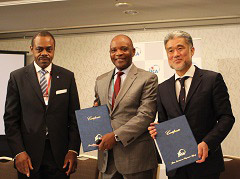
Letter of intent signed with the Africa Centres for Diseases Control and Prevention
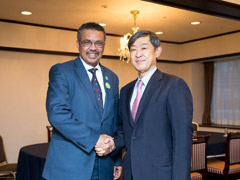
Meeting with World Health Organization Director-General Tedros Adhanom
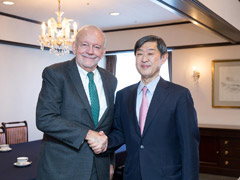
Meeting with UNICEF Executive Director Anthony Lake
(*1) UHC2030 is an international, multi-stakeholder platform that promotes collaborative work at the global and country levels on health systems strengthening, advocating increased political commitment to UHC and facilitating accountability and knowledge sharing. Since 2017, JICA Vice President Takao Toda has been the co-chair of the UHC2030 Steering Committee.
(*2) A set of international development goals from 2016 to 2030 listed in the 2030 Agenda for Sustainable Development, which was adopted by the UN Summit in September 2015. Consisting of 17 goals, 169 targets and 244 indicators, it pledges “Leave No One Behind”.
- Universal Health Coverage Forum 2017 “Tokyo Declaration on Universal Health Coverage: All Together to Accelerate Progress towards UHC”
- Speech by Dr.Shinichi KITAOKA, at the High-level Opening session, UHC Forum 2017
-
Strengthen Country Monitoring Systems of UHC SDG Indicators: A Case of Senegal and Global Practices (PDF/273KB)
-
UHC Forum 2017 Official Side Event “Contribution to Universal Health Coverage (UHC) through Strengthening Continuum of Maternal, Newborn and Child Care (CoC)” —The social and economic benefits of investing in maternal and child health in UHC — (PDF/289KB)
-
Health Systems Resilience against Public Health Emergencies and Roles of Regional Laboratory Network; Efforts in Africa (PDF/144KB)





scroll